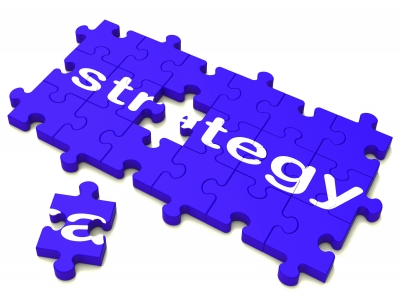Strategy and timing play a big part in your ability to achieve your goals
Having goals (as opposed to “wishes”) is the first step in getting on the right track to where you want to be. Thinking of resolutions for the New Year may be the necessary catalyst behind your goals, but assigning realistic timelines and considering how to achieve measurable results require commitment and a thoughtful strategy.
Some people execute plans very well but are unable to view the broader picture to get a sense of the reasons to change course. Having a clear strategy (and a positive mindset) will be instrumental in helping you achieve your goals, no  matter how much your circumstances may change as you move forward. A strategy helps provide the framework that will keep you on the right path. When the tactics you are using stop working, it is easier to change gears if you understand the bigger picture. If you aren’t getting the results you want from your job search or business development efforts, it may be more than your tactics that need to change. Doing the same old thing because that’s what you always have done can lead to your missing the boat when a new opportunity surfaces. It’s important to start with a strategy for achieving your desired goals, then develop an action plan that supports the strategy. Without a strategy to drive your plan and its execution, your efforts could end up being a complete waste of time.
matter how much your circumstances may change as you move forward. A strategy helps provide the framework that will keep you on the right path. When the tactics you are using stop working, it is easier to change gears if you understand the bigger picture. If you aren’t getting the results you want from your job search or business development efforts, it may be more than your tactics that need to change. Doing the same old thing because that’s what you always have done can lead to your missing the boat when a new opportunity surfaces. It’s important to start with a strategy for achieving your desired goals, then develop an action plan that supports the strategy. Without a strategy to drive your plan and its execution, your efforts could end up being a complete waste of time.
Schedules are great because they provide structure, and structure is helpful for planning purposes, but it can’t always be the driver behind an action plan. It is necessary to stay aware of the goal and adjust your structure when circumstances change. In a bigger sense, without an understanding of the strategy behind an organization’s goals, you are dependent on the person or people who designed the strategy to dictate your action plan. If conditions change and you are left on your own, you’ll need to be clear about why you are doing what you are doing, or your efforts can be wasted, opportunities can be missed, and you can be left out in the cold. Understanding someone else’s strategy, and also having one of your own, allows you to land on your feet when things go off course. If you don’t understand the need for a career strategy, you could end up being slow to change gears when quick action is required.
If you think delaying action for an hour or two, or even days, won’t make much difference to the outcome you desire… think again.
The relationship between strategy and timing is critical. If you think delaying action for an hour or two, or even days, won’t make much difference to the outcome you desire, think again. Consider how planes land and take off. The precision required to enter airspace at exactly the right time to avoid collisions is critical. Imagine what would happen if pilots believed their intentions were more important than their actions. The same applies to someone in job search mode or planning a new business. Understanding the “why” behind your actions is critical to helping you predict potential negative consequences resulting from deviations in timing and will hopefully allow you to work out ways to avoid them. Missing a deadline or taking too long to respond to a request can cause you to completely miss an opportunity, or, at the very least, it can limit your options.
Throwing stuff at the wall to see what sticks is a tactic that rarely pays off in the way we imagine. Haphazard spurts of energy may produce results of some kind, but they are seldom sustainable and may end up leading to false hope when the initial response does not lead to anything longer term. An example is shooting out resumes or marketing pieces to random audiences. There may be an initial response of some kind based on curiosity, but the tactic may miss the mark if you are really looking for a sustainable relationship. Likewise, indiscriminately applying for posted jobs or focusing on developing a “cute” media presence with the hope that someone will find you are far less of a sure bet than digging in and doing the necessary research to understand your audience’s needs and wants.
Learning about the skills required to deliver the results your target companies need is much more likely to tell you how realistic your goals are. Being aware of the timing of special events, when budgets are developed and when seasonal fluctuations typically occur will help you to develop a more effective strategy for going after what you want. Timing your actions according to the intelligence you have gathered and committing to specific tasks at specific times will help you move forward. It also will allow you to track your progress and identify why things may or may not have worked out the way you intended. Overall, a well thought out strategy for achieving your goals and an awareness of critical timelines will help guide you when you face difficult decisions or reach a brick wall.




